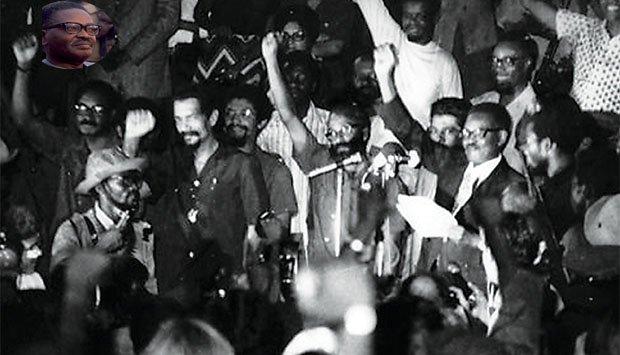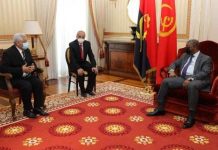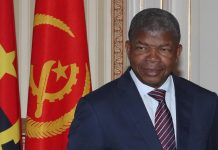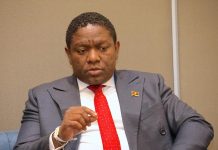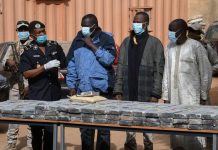Africa-Press – Angola. Similar to Conceição Cristóvão’s observation, in the collection “A Noção de Ser” by Pires Laranjeira and Ana T. Rocha, about the challenge that António Agostinho Neto’s description presents, I consider this task of examining the influence of strategic thinking of Neto in the construction of the Angolan Nation as frightening.
Today’s topic brings with it intellectual and academic challenges of inhuman proportions; not in the sense of being devoid of feelings or love. Simply of dimensions that are not comforted by the human capacity to conceptualize, inquire, research and synthesize. All this because today’s topic has three aspects that are extremely difficult to summarize in 30 minutes: the strategic thinking of António Agostinho Neto, on the one hand; the construction of the Angolan Nation, on the other; and how the first aspect influenced the second; how the Angolan nation emerged or shaped itself from this strategic thinking.
As you can imagine, the volume of works by and about Neto is enormous. Perhaps the characterization of Engineer Amílcar Cabral’s wife about Neto can help us understand the dimension of the son of teachers who exercised their professions in the Dembos who became a doctor in Portugal. In 2011, Ana Maria Cabral said that “Neto was like a God”. For this Cape Verdean nationalist, Neto embodied the desire to see the colonies liberated, independent. Likewise, Neto’s legacy illustrates its dimension Just note that Google, a digital search engine, has 72,000 articles with the name António Agostinho Neto, so far.
There is another almost insurmountable task: that of characterizing Neto’s strategic thinking. If we think for a minute and believe in astrology, we can take some convincing steps. With the sign Virgo, having been born on the 17th of September, the first President of Angola would have been objective, organized, perfectionist, focused on details, practical and self-critical. However, our belief in astrological signs has been refuted in science (see Miguel and Carvalho, 2014). What seems to exist is an influence of the knowledge of astrological characteristics on human behavior (see Pacheco, Nagelschmidt and Rodrigues, 2007).
This inability to trust astrology leads us to understand Neto’s strategic thinking in other ways. But first of all, a certain conceptual framework is required here; a certain construction of indicators of strategic thinking so that later we can understand how Neto, with his thinking, will have influenced, in a strategic way, the construction of Angola as a nation. In this academic incursion, Iko Carreira’s attempt to describe Agostinho Neto’s strategic thinking, in a 236-page book, published by Dom Quixote in 1996, does not escape us. of: vision, pragmatic diplomacy, security of actions, empathy between leaders and Neto, careful choice of actions, attention to detail, real implementation, concrete results and objectivity in the design of strategies. Neto, from the perspective of Iko Carreira, created clear mental images of the results of the actions and did not stop efforts to materialize them. Some of these desiderata were the recognition of Angola, the existence of unconditional support for the MPLA and its liberation struggle, among others. Without a theoretical framework, however, it is difficult to establish whether these attributes, recognized to Neto by Iko Carreira, constitute strategic thinking or not.
Intuitively, strategic thinking has been seen as pragmatic and critical thinking, one that focuses on the big picture, forward-looking and contingent. Qualities of strategic thinkers such as Napoleon Bonaparte and others are also ventured. Among these, there is lifelong learning, listening to the opinions of others, taking risks and tending to stick to a collective purpose. Additionally, historians and political scientists have dealt with this theme. For example, let’s take a look at the book by Valentim José Pires Antunes Rodrigues, Captain-de-sea-and-war of the Portuguese Navy. In 2014, in the book Strategic Leadership and Strategic Thinking, Valentim Rodrigues characterized the strategic thinker as being able to develop a vision of the future, capable of operating in complex and ambiguous environments and of envisioning the future. Four years before the publication of Valentim Rodrigues’ book, José Alexandre Altahyde Hage, PhD in Political Science, had already addressed the strategic thinker’s ability to idealize the future. This last author explains that the strategic thinker seeks to foresee imaginable problems. But the person who best addressed this issue of strategic thinking was Paulo Roberto de Almeida, in the book edited by Sérgio Eduardo Moreira Lima, entitled Diplomacy and Strategic Thinking (2016). Paulo de Almeida begins his approach to the strategic thinking of the Brazilian historian, diplomat and military officer Francisco Adolfo Varnhagen with indicators of strategic thinking. He wonders if Varnhagen influenced a course of action, thought of reforms for the problems of the future.
Therefore, this essay adopts the aforementioned characterization of strategic thinking as its theoretical framework or conceptual framework. In this path, strategic thinking is associated with pragmatism, a great vision of the future, the ability to operate in highly complex environments, as well as the competence to foresee future problems, always idealizing a different future. But it is necessary that these attributes influence the course of action and create reforms. If we think about it, António Agostinho Neto was all that and much more. Let us highlight some of these qualities in Neto’s thinking, examining the way in which these attributes of Neto will have influenced the construction of the Angolan Nation. This approach is based on testimonies of third parties with whom he lived and audio and audiovisual interventions of the man who was decreed,
Before we start looking at Neto, the pragmatist, let’s talk a little about the concept of pragmatism. Renato Rodrigues Kinouchi reminds us that the word pragmatism is polysemic, it has many meanings. But, according to Kinouchi, the pragmatist is not bound by ideological principles or metaphysical foundations. The pragmatist deals with issues with a view to their practical consequences. So, when we say that Neto was a pragmatist, we are dissociating him from the theoretical, conceptual and ideological world. We are looking at Neto the doctor, leader of the MPLA, the founder of the Angolan Nation, the President of the Angolans, the reformist. And how was this attention to practical results manifested in Neto? But most important of all, How has this attribute of Neto influenced the construction of the Angolan nation? I must say that Neto placed little hope in diplomacy of words. He was more concerned with the results of diplomacy. For him, it was important that political acts be transformed into concrete actions in the theater of operations. Therefore, we were not surprised to hear Neto use the word “real” to represent the word “practical”. It is worth remembering one of the many interviews he gave. During the negotiations between the three movements mediated by Portugal, in the period of decolonization, and in an interview with Portuguese journalists, Agostinho Neto described his main desideratum as the achievement of “a real independence”, after the Algarve conference in 1975. He was more concerned with the results of diplomacy. For him, it was important that political acts be transformed into concrete actions in the theater of operations. Therefore, we were not surprised to hear Neto use the word “real” to represent the word “practical”. It is worth remembering one of the many interviews he gave. During the negotiations between the three movements mediated by Portugal, in the period of decolonization, and in an interview with Portuguese journalists, Agostinho Neto described his main desideratum as the achievement of “a real independence”, after the Algarve conference in 1975. He was more concerned with the results of diplomacy. For him, it was important that political acts be transformed into concrete actions in the theater of operations. Therefore, we were not surprised to hear Neto use the word “real” to represent the word “practical”. It is worth remembering one of the many interviews he gave. During the negotiations between the three movements mediated by Portugal, in the period of decolonization, and in an interview with Portuguese journalists, Agostinho Neto described his main desideratum as the achievement of “a real independence”, after the Algarve conference in 1975.
The pragmatism of Neto, the man who would have organized the armed resistance against the Portuguese settler in Angola, was not limited to the search for practical results. His departure from Portugal, as Honorary President of the MPLA, after being released in 1962, to Leopoldville certainly represents a very pragmatic scenario, even more so if we take into account that as soon as he arrived there, Neto was faced with the crisis of leadership within the MPLA, as explained by Portuguese historian João Baptista Gime Luís (2021). Already Donald Burness, in “A Noção de Ser”, reminds us of Neto as a humble man, devoid of vanity and perks. Donald Burness says, in his contribution entitled Agostinho Neto and the poetry of combat, that Neto “… personally visited interior sections,
Two other episodes of Neto’s practicality were his completion of studies, despite the three occasions he was incarcerated and the fact that he got married on the very day he completed his medical studies. There was also, this time, almost two years after Neto had proclaimed Angola’s independence, the so-called “Operation Kwanza”, whose preparations Neto said had been successfully kept secret for a few months. In this reform, Neto managed to change the Portuguese colonial shield by Kwanza, the Angolan national currency, thus helping to build Angola’s banking and financial market. In Agostinho Neto: Profile of a struggling poet, Maria Teresa Marques and Maria Virgínia Melo, in a morphological and grammatical analysis of fifty-one poems by Neto conclude, with deep admiration, that Neto was a man of great courage,
Still focusing on practical consequences and the emphasis on real results, Neto reminded us, very early in his governance, of the independence that was not yet real:
“… a defect that colonialism left us. Culturally, we have not yet overcome our dependence on Portugal and Europe in general. We are still thinking in the Portuguese way and we need to start thinking in the Angolan way. And this I say mainly to comrades who are civil servants, we have good land in Huambo, Huíla, Moçâmedes, Malanje. We have, in our country, an admirable climate, a plateau climate that allows for rest…”
As for your big vision of the future, our second indicator of strategic thinking, we must look to the literature to understand this phrase: big vision. Big vision can mean holistic vision. Brandão and Crema (1991) explained that the holistic view was the view centered on the whole; he didn’t just look at the provinces, he looked at the country; not just oppressed blacks, but subjugated Asian peoples. Grandson was exactly that. The slogan “in Namibia, Zimbabwe and South Africa is the continuation of our struggle” embodies this approach centered on the whole; all peoples. There is also another approach on the holistic vision. Leite and Strong (2006) clarify that the vision holistic has to do with the interaction between the microcosm and the macrocosm.
The small world and the big world interact in this holistic view. This holistic vision of Neto is evident in his associativism. His associativism began at the Casa dos Estudantes do Império, a youth association whose members came from the Portuguese colonies, which emerged precisely at the time of Neto’s departure to Lisbon, in 1944, with a delegation in Coimbra, where Neto studied and from which became a leader. But Neto’s holistic vision was also in his ambitions. Neto’s main vision was to unite Angolans, of different colors, different political tendencies, different religious tendencies, etc.; in fact, the MPLA represented the fusion of patriotic movements existing around 1956. In reality, Neto always elevated his struggle to broader and more holistic aspects, such as the rescue of human dignity.
Let us remember that Neto was a medical student who decided to get involved in political activities. He was first arrested in 1951 while collecting signatures for a peace conference to be held in Stockholm, Sweden. As soon as he got out of jail, Neto joined the Portuguese youth movement, that is, Movimento de Unidade Democrática, MUD. It was during this period that he began to show his ability to operate in highly complex environments. Remember that the ability to operate in highly complex environments is the third indicator of strategic thinking. In reality, Neto’s life had three moments in which he found himself operating in complex environments: student underground, guerrilla warfare and the presidency in times of civil war. During youth clandestinity, Neto has integrated and co-founded several organizations. For example, after having spent 10 months in jail (1955-57), Neto became a co-founder of MAC, Movimento Anti-Colonial, in 1958, at a time when the PIDE had been strengthened.
From 1957 onwards, raids and torture took place in Portugal, a country where Neto divided his time between studying medicine and going underground. In Coimbra, despite the pressure of the secret police, Neto collaborated in the magazine Momento, a publication of the Associação dos Naturais de Angola. Still in the context of liberating nationalist movements in Europe, Neto participated in the founding of the Center for African Studies in Portugal, a clandestine institution created in Lisbon by African students and intellectuals in the 1950s. Likewise, Neto co-founded the Clube Marítimo Africano in 1951. This entire period was marked by poetic productions by Agostinho Neto. And in terms of nation building, Carmen Lucia Tindo Ribeiro Secco argues that the poetry of Neto and others like Senghor and Frantz Fanon became an instrument of resistance and politicization, putting their writings at the service of liberating projects. In other words, with poetry, Neto helped to raise awareness among the people and free them from the colonial yoke. In fact, Neto chose to operate and dialogue with poetic guerrilla voices with whom he shared philosophy, political and literary actions, as explained by Carmen Secco in When the «sacred certainties» melt into the air, in the book A Noção de Ser. And much more could be said about Neto’s ability to operate in complex environments. Neto chose to operate and dialogue with poetic guerrilla voices with whom he shared philosophy, political and literary actions, as explained by Carmen Secco in When the «sacred certainties» melt in the air, in the book A Noção de Ser. And much more could be said about Neto’s ability to operate in complex environments. Neto chose to operate and dialogue with poetic guerrilla voices with whom he shared philosophy, political and literary actions, as explained by Carmen Secco in When the «sacred certainties» melt in the air, in the book A Noção de Ser. And much more could be said about Neto’s ability to operate in complex environments.
Just remember the codenames, Manguxi, Kimbundu for Agostinho and Kilamba, which he used to deceive the secret police. It should also be remembered that Neto led the war of liberation, creating satellite organizations such as the Angolan Volunteer Assistance Corps (CVAAR). Even the proclamation of independence was carried out in a period of high complexity. There was a civil war in the country that divided it into three parts – one occupied by the MPLA; the other by the FNLA and the third by UNITA. But will, pragmatism and the ability to operate in complex environments allowed Neto to prevail and thus create the Nation of us all – Angola.
But Neto not only created a Nation, but built the foundations for its progress. To do so, Neto had to be able to foresee future problems. It is worth remembering here that Neto was the son of a Protestant pastor. Protestantism arises from the identification of errors and abuses of the Catholic Church. Therefore, Neto was adept at identifying future problems. In an interview with Portuguese journalists in 1975, after the Algarve conference between the three movements, Neto foresaw pressure from abroad that would try to dominate our country because of our agricultural and mineral wealth. Neto foresaw pressure from multinationals and forces in the interior, a prophecy that came true in the years following his death in 1979.
Neto’s ability to anticipate problems has always been linked to another facet of his strategic thinking – the ability to always envision a different future. Carmen Lucia Tindo Ribeiro Secco, in A Noção de Ser, texts on the poetry of Agostinho Neto, characterizes Agostinho Neto as a “dreamer of freedom.” In his words, Neto idealized a people with strong political convictions. He said:
“Our people must acquire a fundamental political conscience…to resist the enemy’s attempts to destroy us, either now or in the future after we acquire our independence.”
The dimension of his dream was greater than the political awareness of the people. In the poem “Adeus à Hora da Largada”, written before Angola’s independence, Neto said:
Tomorrow we will sing hymns to freedom when we commemorate the date of the abolition of this slavery
But the big question remains: how will Neto, with pragmatism, have the ability to operate in complex environments, the ability to foresee problems and the ability to idealize a different future, contributed to the construction of the Angolan Nation? These characteristics of Neto gave us independence in 1979; maintained the territorial unity of Angola from Cabinda to Cunene, from the sea to the east; they allowed the Portuguese escudo to be replaced by the Kwanza, the national currency; ensured territorial defense; they gave us an identity; created infrastructure; ensured our international recognition as an independent nation; they gained international support and a lot of solidarity from people like Cuba, who have helped us to this day; a high place in the concert of nations; the isolation of the rebels by the African policy of non-interference in internal affairs; international recognition for the policies of “peaceful coexistence” and “respect for sovereignty.”
But in true Neto style, we must ask ourselves, what will Neto have done with concrete for the edification of the Angolan nation? António Agostinho Neto was already concerned with the diversification of the economy, starting with the valorization of family farming, constituting a viable path to development. Just interpret what he always said about agriculture. «Agriculture is the basis, industry the decisive factor». Here we have the origin of public diversification policies, as defended by Victor Kajibanga (2020). Neto had the ability to see beyond the surface, eg oil. There was also Neto’s policy of naming each year the priority strategy. You may remember that 1976 was the year of widespread popular resistance; 1977 – year of the 1st Congress of the MPLA and the Creation of the Party; 1978 – year of agriculture; 1979 – year of staff training. In this strategy, there was a construction of the nation by priority areas. Then there was the issue of prioritizing the use of his time to dedicate himself more to the real problems of the Angolan people. President Neto tried to evaluate well the international forums that should deserve his presence, as noted by Iko Carreira. In fact, this search for practical results led Neto to declare, in the poem Adeus à Hora de Largada, that “I am the one for whom you wait.”
Because of his pragmatism, ability to operate in complex environments, ability to anticipate problems and envision a different future, Neto helped build the Angolan nation.
*João Canoquena is Rector of the International University of Cuanza, Kuito, Bié. He was Vice-Rector of the Methodist University of Angola for the Academic Area. He holds a Bachelor of Science in Education (English Language Teaching), a Master of Science in Education (English Language Teaching), a Doctor of Management and Strategy (Road Safety) and a Doctor of Financial Accounting.
For More News And Analysis About Angola Follow Africa-Press

